
While some people wear makeup to create an illusion of perfection and others to impress suitors, some wear it as a form of enjoyment or expression. Whatever the purpose—if it makes you happy, why the hell not?
Women get a lot of criticism for wearing makeup. If they wear too much, they are called cake-face, but if they don’t wear any all, they either look tired or sick. Society expects women to be flawless; women are expected to be well-dressed and well-mannered, all while having the perfect au naturale beauty. We live in an oxymoronic society where many women try to achieve the no-makeup-makeup look.
Some critics would say women wear makeup solely to impress men. I must have missed the memo about our entire existence being dedicated to impressing men. But that criticism also holds some truth. Women and men can wear makeup to impress suitor, but so what?
It’s one thing for men to criticize women for what they do or wear. But women who criticize other women are even worse. Women who choose not to wear makeup have the right not to and shouldn’t receive any shame or ridicule. However, many women who don’t wear makeup hold such hostility towards women who do.
It’s great if an individual feels beautiful in his or her own skin. But if he or she prefers a little enhancement through makeup, who cares?
Reversely, women who enjoy wearing makeup do not care if someone does or doesn’t. These same women generally support and teach their talents, rather than criticize.
Contextually, makeup has been around for thousands of years holding many cosmetic, symbolic or traditional values. Long before 4,000 B.C., Egyptians used substances found in nature as makeup. It was widely popular among both men and women. Their makeup was worn to distinguish social status, part of rituals and even used to protect the skin from harsh conditions of the desert.
The Greeks and Chinese used chalk and rice, respectively, to whiten their complexion. Roman men died their hair blond while Roman women used sheep’s fat and blood as nail polish.
Fast-forward a couple hundred years, Elizabeth of England, Queen Elizabeth I, the aristocracy and both sexes of the colonial era all used white lead paint to lighten their complexion. It wasn’t until present day when makeup was feminized and unjustly judged.
Makeup is whatever you make of it. Makeup is an art form. Many people do not see it as such, but it does take a long time to master and everyone has their own style. Makeup artists and the everyday consumer might agree makeup is not only fun but it also takes time, patience and even training to master.
Many people would be surprised at how great makeup is. All of the so called manly or cool movies that involve aliens, mystical creatures, etc. all use special-effects makeup. If not for the men and women in the special-effects makeup industry, movies and television shows wouldn’t be as great as they are today. If you hate on makeup and people who wear it, you’re hating on all those movies too.
So if makeup is something you are passionate about, go for it. Most importantly, makeup shouldn’t pigeonhole your gender identity or sexual preference.
I’ve always said lipstick is just like war paint. If I want to cake my face with makeup, I will do so. Makeup is not defining, but liberating. Society needs to liberate makeup in return.






